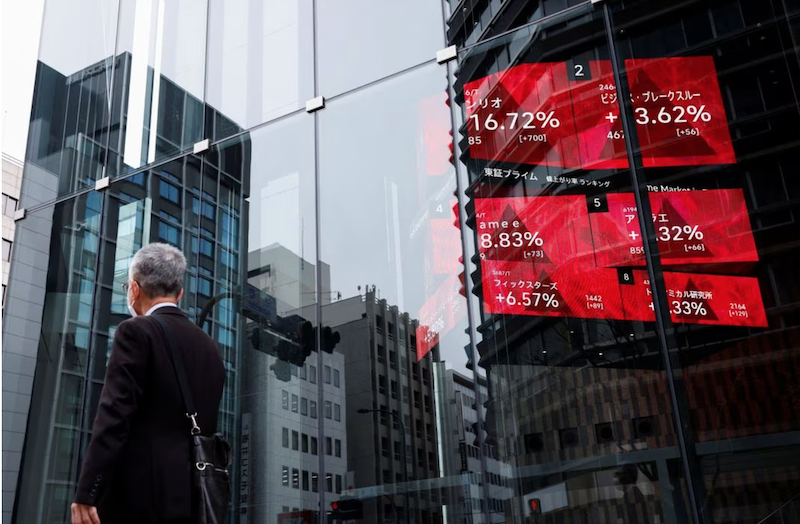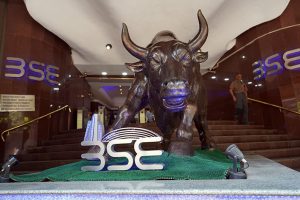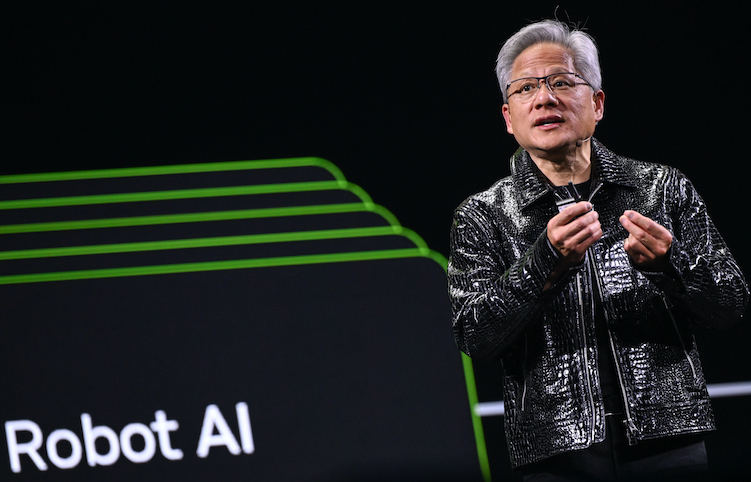Asia’s major stock indexes were largely in the green in Wednesday with investors remaining optimistic that the US Fed is set to begin easing back on interest rates after a painfully long tightening campaign.
Shares across the region tracked Wall Street higher as rate cut fever lingered, while oil held on to gains from the past two days after Houthi militants’ attacks on ships in the Red Sea disrupted maritime trade.
Japan’s Nikkei closed at a more than five-month high as caution on the Bank of Japan’s (BoJ) policy stance faded after the central bank offered no hints on when it would exit its negative rate policy.
Also on AF: Toshiba Delists as New Owners Told to Eye ‘Deep Tech’ Future
The Nikkei share average was up 1.37%, or 456.55 points, to close at 33,675.94, while the broader Topix was ahead 0.67%, or 15.57 points, to 2,349.38.
The BoJ maintained its ultra-loose policy on Tuesday in a widely expected move, and made no change to its dovish policy guidance.
Shipping rose 3.16% to become the top gainer among 33 industry sub-indexes on the Tokyo Stock Exchange.
China stocks declined on Wednesday, with investors gradually losing hope for any stimulus surprises from Beijing, while Hong Kong shares rose tracking overnight Wall Street gains.
Analysts said investor sentiment is gloomy after last week’s Central Economic Work Conference fell short of offering any significant policy support measures to bolster a faltering recovery.
The blue-chip CSI 300 Index dropped 1.10%, while the Shanghai Composite Index lost 1.03%, or 30.28 points, to 2,902.11. The Shenzhen Composite Index on China’s second exchange dropped 1.23%, or 22.20 points, to 1,785.34.
In Hong Kong, Alibaba Group jumped 3.4% by midday amid the news that the firm had appointed a new CEO to head its domestic e-commerce arm Taobao and Tmall Group.
The Hang Seng Tech Index gained 1.1% and the benchmark Hang Seng Index gained 0.66%, or 108.81 points, to 16,613.81.
Elsewhere across the region, in earlier trade, Seoul rose more than 1%, while there were also healthy gains in Sydney, Bangkok, Singapore, Taipei, Manila and Jakarta, though Mumbai and Wellington sank.
MSCI’s broadest index of Asia-Pacific shares outside Japan rose 0.8% to a fresh four-month peak.
Red Sea Attacks Spark Oil Price Rise
Europe was set to open higher, with Eurostoxx 50 futures up 0.3% and FTSE futures gaining 0.3%. S&P 500 futures and Nasdaq futures were both up 0.1%.
Overnight on Wall Street, the Dow Jones rose 0.7%, for another all-time closing high, and the Nasdaq Composite added 0.7% to reach its highest since January. The S&P 500 gained 0.6%.
The rally was fuelled by an unexpectedly dovish tone from US Federal Reserve Chair Jerome Powell last Wednesday on rate cut prospects next year, with the stock market having paid little attention to subsequent pushback by other Fed officials.
Falling yields also propped up equity valuations. Benchmark 10-year yields slipped 1 basis point to 3.9125%, just above their five-month low of 3.8850%, while two-year yields eased 2 bps to 4.4219%, nearing a seven-month trough of $4.2820.
Elsewhere, oil prices were gripped by worries about disruptions in the Red Sea after Yemen’s Iran-aligned Houthi militants stepped up attacks on commercial ships. The US said it was setting up a task force to safeguard commerce there.
US crude futures were little changed at $73.98 a barrel, after rising more than 1% on Tuesday, while Brent was flat at $79.20 a barrel.
S&P Global Market Intelligence expects that it is likely all three major shipping alliances will halt services covering up to 85% of all container fleet crossings of the Suez Canal.
“A reduction in commodity product crossings of Suez may drive a bifurcation in oil, refined oil and other commodities between Asian and Atlantic basin markets, and potentially more volatility in prices,” said Chris Rogers, head of supply chain research at S&P.
Key figures
Tokyo – Nikkei 225 > UP 1.37% at 33,675.94 (close)
Hong Kong – Hang Seng Index > UP 0.66% at 16,613.81 (close)
Shanghai – Composite < DOWN 1.03% at 2,902.11 (close)
London – FTSE 100 > UP 0.80% at 7,699.40 (0933 GMT)
New York – Dow > UP 0.68% at 37,557.92 (Tuesday close)
- Reuters with additional editing by Sean O’Meara
Read more:
Red Sea Attacks Disrupt Key Asia-Europe Sea Trade Route
Will China Take on More Debt Chasing 5% Growth in 2024?
China Banks Pushed to Sell Bad Loans as Consumer Defaults Soar
Nikkei Rallies as BoJ Stands Firm, Tech Weighs on Hang Seng























